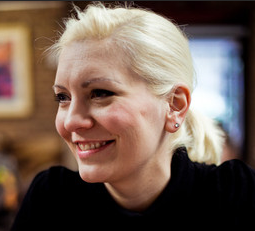Many multipotentialites want to start their own blog or business but struggle to find an idea that they can commit to but which doesn’t feel too limiting. They’re excited to get started but they’re scared they’ll fall out of love with their business before it becomes profitable or that they’ll get bored of their new interest before they get anywhere with it.
Most traditional advice urges us to pick a niche and dominate it. Niches are usually described as specific topics within bigger areas. For example, to niche down, rather than starting a blog about photography, you might start one about wedding photography. Instead of just writing about travel in general, you might choose to focus on travelling without luggage. And so on.
The problem with niches, for multipotentialites, is that we don’t want to get stuck with one that is too narrow. Could you really stay interested in wedding photography for a long period of time? Didn’t think so. Even photography probably feels limiting, because you’d also want to talk about fitness, cooking, business, and dating, right?
Emilie’s Renaissance Business approach ditches the niches and encourages you to bring all of your interests together. She has managed to help people create businesses out of interests as diverse as wellness, education, and comedy, thanks to the concept of overarching themes (check out the full story here). To do that, you need to look beyond the individual topics you have in mind and start thinking bigger.
Start with an audience
Instead of looking for a topic, start thinking about the type of people you enjoy hanging out with. Are they artists? INFJs? Freelancing mums? People who like body art?
Find a group of people who share your lifestyle or philosophy and start asking yourself what they need. Puttylike is an excellent example of this approach. Emilie couldn’t stick to one interest, so she created resources and a community for other people like her. How could you help people like you?
Find a bigger theme or a principal
Emilie suggests finding an overarching theme for your interests and using this theme as the basis of your business or blog. But how do you find your theme? Try asking yourself the following questions.
- What do I believe in?
- What experiences have I had that have changed the way I view the world?
- What lens could I use to discuss almost anything?
A great example of an overarching theme is Chris Guillebeau’s Art of Non-Conformity. Chris discusses life, travel, and entrepreneurship through the lens of unconventional living. Tyler Tervooren’s Riskology covers topics as diverse as work, psychology, social skills, and running. What brings all these topics together is his overarching theme of living a better life by taking smart risks. Leo Babauta of Zen Habits applies minimalism to all aspects of his life, from decluttering his home to the way he eats. Perhaps you have a way of viewing the world that could allow you to explore your many different interests in one project?
Find a framework
Rather than a theme or a philosophy, is there a tool, a framework, or a system that has helped you to accomplish difficult things in your life? Yes? Then use it!
Tim Ferriss uses the Pareto principle (also known as the 80/20 rule) to find success in business, to get fit, and to learn how to cook. Is there a tool or system that you’ve had great results with? Could you teach others to apply it to their lives?
Become a leading learner
Start a blog that can become your playground. Use it to take people through your journeys and discoveries. Then take your learnings and package it into books or courses, so that others can learn from your experiences. This is a great way to explore freely, to learn, and to have something to show for, even if you move straight on to your next interest.
Your Turn
Have you used one of these approaches to start a blog or business? Or have you found another way to bring all of your interests together without limiting yourself?

Jessi Frey is a product developer and a former musician who writes about starting a business like an artist at worklikearockstar.com. In the past she has started a band, an indie label, and a natural cosmetics company. She currently works as a product manager in a tech company. For fun, she created a renaissance blog at thechallengist.com, where she aims to complete twelve 30-day challenges in one year. Connect with her on Twitter @jessifrey.

Want to combine ALL of your interests in one business, check out our digital guide, Renaissance Business.

Jessi, I just looked into your blog and I saw how you really used the strategy you mentioned at the end of your post on Becoming a Leading Learner. Interesting, I’ve actually given it a thought in the past weeks. I have a blog but I haven’t found an overarching theme I could stick with other than MY LIFE hehe.
The challenge I find with discovering overarching themes is that it really requires you think, think and think. Even if there is a process on coming up with your theme, it may take a while before you discover it and this might challenge your desire to start and just do it.
So maybe an overarching theme can develop along the process.
I am glad to read other suggestions from your blog post like using a framework and starting with an audience. Starting with a framework sounds interesting. I might try to use that in combination with the Leading Learner approach.
Right now, I simply use my self and my life as a starting point to everything I do.
I’m really using my blog as a playground, more of a scratch pad actually, to get to know myself deeper and to know the blog’s potential to start something I will be proud of. Just happy to see what other people are doing.
Hi Vincent,
Thanks for your comment!
You’re absolutely right in thinking that your overarching theme will develop in the process. Only by doing something, will you be able to discover what really makes you tick and what about your work will also attract other people.
I can recommend a book called “Screw Work Let’s Play” by John Williams. He’s also a multipotentialite, and urges you to start with whatever interests you, and make it a “play project”. As you play and have fun with your project you will also develop it further, and eventually figure out where the money is. For him this is the formula of finding work you love, without making it hard for you to get started by over-complicating the process, or by trying to find The Perfect idea.
I read somewhere that nearly 90% of entrepreneurs say that their business idea has changed during their journey, so it’s totally normal to start in one place and end up in somewhere different. 🙂
Good luck with your blog, it looks great!
Hi, Jessi!
I really like these ideas about finding the right theme for a blog. I went through the questions, and came up with some ideas, particularly when I thought about my future audience. I think I’m going to ask a few people if they’re interested, then I give it a try.
Thank you. 🙂
Could someone tell me is it okay to rebrand and rebrand until you find the right combination for your overarching theme?
I am talking specifically social media, your blog, etc…
If you haven’t decided on your main theme would it best to market yourself as johnsmith dot com who cooks and runs and rides and trains horses. Rather than using gallopingourmet dot com.
Your audience could get lost if you switch too often. I would rather be known as John Edward Smith the Galloping Gourmet rather than just the latter.
And then what happens if your start another theme, once your first theme is established?